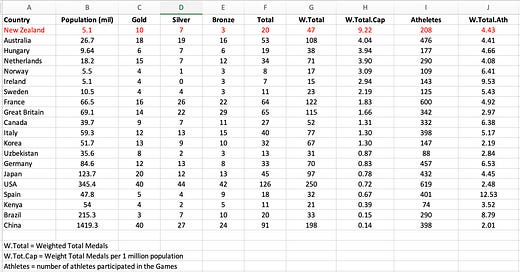Ranking the 2024 Olympic Games: Which Country Truly Comes Out on Top?
I argue that the real champion is not the US or China, but rather New Zealand.
Now bear with me for a minute.
The most straightforward method of ranking countries is by the number of gold medals won, as gold is the pinnacle of Olympic achievement. According to this measure, the US and China are tied at the top, each securing 40 golds. Japan, with 20 golds, impressively took third place, while Australia, my home country, landed in fourth with 18 golds, ahead of France's 16.
However, focusing solely on gold medals doesn't give the full picture, as it overlooks the value of silver and bronze medals. Surely these achievements matter too? Indeed, they do. So, a more comprehensive approach is to consider the total medal count. By this metric, the US still leads with 126 medals, followed by China with 91, Great Britain with 65, France with 64, and Australia with 53.
But even the above method isn’t entirely fair. Gold medals should be valued more than silver, and silver more than bronze. To account for this, I propose a weighted system where bronze medals are worth 1 point, silver medals are worth 2 points, and gold medals are worth 3 points. Using this formula:
T = 3Gold + 2Silver + 1*Bronze.
When ranked by T, the US still holds the top spot with 250 weighted medals, followed by China, France, Great Britain, and Australia.
Yet, this ranking might still be skewed in favor of larger countries, which have a greater pool of talent to draw from. A fairer method might be to normalize the weighted medal count by the population of each country:
R = T / population (in millions).
Using this metric, New Zealand emerges as the top performer of the Olympics Games 2024. With a population of just 5.1 million and a weighted total of 47 medals, New Zealand achieves an outstanding 9.22 medals per million people—the highest in the world.
My Australia comes in second place. With a population of 26.7 million and 108 weighted medals, Australia boasts 4.04 medals per million people. We will surely be #1 next time.
An interesting side note: another way to analyze performance is to consider how many athletes it takes for a country to win a single medal. This is similar to the concept of 'Number Needed to Treat' in medicine (i.e., how many patients must be treated to prevent one adverse outcome). The ratio can be calculated as:
Q = number of athletes / number of medals.
According to this measure, China excels, needing only 2 athletes to win 1 medal. South Korea follows closely with a Q of 2.2, and the US ranks third with a Q of 2.5. On the other hand, Spain requires 12.5 athletes to win a single medal!
These numbers are, of course, meant to be taken lightly. Some suggest that wealthier nations win more medals because they can invest more in sports, but this isn’t always true. For instance, North Korea, which is poorer than Vietnam, has 6 medals while Vietnam has none. Conversely, wealthy Singapore has only 1 medal. In fact, the correlation between the number of medals and a country’s per capita income is quite low.
In my view, the number of medals a country wins depends primarily on two factors: luck and skill. Luck plays a role when an athlete performs exceptionally well at just the right moment, while skill is cultivated through training and a supportive environment. If we use the Q factor as a rough measure of skill, then China and South Korea certainly stand out.
In conclusion, based on this analysis, New Zealand can truly be considered the top-performing country in the 2024 Olympics, with Australia not far behind.





